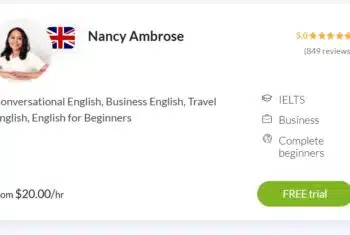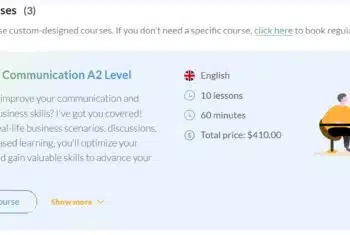The truth is that nobody tells you how many hats you have to wear, how emotionally draining it can be, or how long it takes to create something that feels sustainable.
The Business Of Online Teaching: What Nobody Tells You About Making It Sustainable
Join a global community of over 200,000 TEFL teachers working throughout the world! Enrol me!
You’ve made the leap and started your very own teaching online business. No more clocking in, micromanagement, or scrambling for bookings. You’re freeeee!
But before you get too comfortable, here’s a reality check: most online teachers don’t fail because they can’t teach, but because they can’t keep teaching. You need students to teach. Your challenge is building a business that supports you in the long run. We’re talking sustainability.
Read more: Becoming A Freelance Teacher Online With TEFL
Nancy is a qualified accountant and experienced online English teacher with over nine years of lessons to her name.
The reality of running an online teaching business

I don’t mean “six-figures-in-six-months” sustainable. I mean doing the work that I enjoy, serving clients proudly with exceptional service, having a full work calendar, and a bank account that isn’t constantly teetering on the edge.
This is the article I wish someone had handed me before I started.
So if you’re just getting into the business of online teaching, or you’re in it and wondering why it’s harder than it looks, this is for you.
Read more: From Classroom To Business: Exploring The Teacherpreneur Movement
Why instant success is a myth in online teaching
We’ve all seen the posts:
‘I had a 5-figure month with one digital course!’
‘Just start teaching what you know — people will find you!’
‘If you’re good, the clients will come.’
Except they don’t, at least not consistently. Not without a strategy and a whole lot of patience.
Read more: How To Find Private English Students
The hidden challenges most new online teachers face
In my first few months, I poured energy into the lessons, offered free resources with social media posts — you name it, I’ve done it!
I had more ideas than hours.
What I didn’t have was a real plan, clear messaging, or boundaries around times and pricing.
What most people don’t tell you is that online teaching is less like a sprint and more like slowly building a house. You lay a foundation, brick by brick. Some days it feels like you’re building in quicksand and all your hard work sinks, and other days it’s better.
The good news? You’re not doing it wrong. It just takes time and effort.
Always remind yourself that you’re learning. Your learning curve never stops!
Read more: Can I Be A Freelance Teacher?
Emotional labour: what nobody talks about in online teaching
Online teaching is emotional work. You need to:
- Build relationships with your students without seeing them in person.
- Manage student engagement, which can be difficult in an online environment.
- Work long hours, which can lead to emotional exhaustion.
You’re not just delivering a lesson; you’re holding space for someone else’s goals, insecurities, learning blocks, and stress.
And when you’re running your own teaching business, you’re also stressed about getting results, your income, being successful and making an impact.
Coping with teacher burnout and blurred boundaries
Nobody prepares you for the energy dip after back-to-back sessions, or the guilt when a client isn’t progressing as you envisioned, or the emotional rollercoaster of launching something and hearing ‘crickets’.
Note from the editor: Many of these things are felt by TEFL teachers teaching English all over the world in face-to-face classrooms. The difference is that in those situations, you have a staffroom and a group of people who share your space on a daily basis. They understand your reality, and are there for you to vent with, share ideas and come up with solutions together.
Burnout doesn’t always come from doing too much. Sometimes it comes from constantly feeling too much, especially when boundaries are blurred and you feel responsible for every student’s outcome.
Read more: Self-Care And The TEFL Teacher: How To Avoid Teacher Burnout
So, what helped me?
- Limiting my availability.
- Giving myself recovery time between calls.
- Reminding myself that supporting someone’s learning is not the same as carrying it for them.
It’s important to realise that you’re not working for a boss. YOU are the boss, so be realistic when setting business goals.
Remember, you’re not in a race, so don’t compare yourself to others. Maintaining an online business demands self-motivation, discipline and resilience.
The financial reality of building a sustainable online teaching business
Here’s a hard truth: the income from online teaching can be incredibly unpredictable, especially in the beginning.
One month, you’re full. The next? Cancellations, slow sign-ups, or just silence.
It’s not just about getting clients, it’s about creating predictable, repeatable income — that’s where sustainability starts to show up.
Read more: Attracting Corporate Clients for Business English

Pricing, packages, and planning for slow seasons
For me, a few key shifts helped:
- Offering packages instead of single lessons.
- Planning for slow seasons (yes, August, I’m looking at you).
- Charging based on value, not just time.
Another thing nobody mentions is that you need a buffer. That means having enough in the bank to feel like you can breathe.
Nothing stifles creativity like financial panic.
You need to be mindful of managing your finances, which includes seasonal fluctuations and unexpected downturns.
Read more: Why TEFL Is A Great Online Side Hustle
Why marketing is essential for online teaching success
Let’s be honest — most of us didn’t get into this because we love marketing. We got into it because we love teaching.
But the reality is, you can be the best teacher in the world and still have no clients if nobody knows who you are.
Marketing isn’t just a side task; it’s the engine of your business. And unfortunately, posting on Instagram doesn’t cut it.
The hardest part? Showing up consistently (not only when you feel inspired) with a message that speaks to the right people in the right way.
Read more: How To Start Teaching Online To Earn Money: Why Word Of Mouth Matters In ESL Teaching
Simple marketing strategies for independent online teachers
Here’s what helped me find my rhythm:
- Picking one or two platforms and doing them well.
- Building a small but engaged email list.
- Talking like a real person, not a brochure.
- Reusing content — your past posts are gold; recycle them.
Marketing gets easier when you stop being “professional” and start sounding like yourself.
People buy from people, not logos.
Just be genuine. Send a message that can be clearly understood and grabs attention.
Read more: 7 Easy Steps To Being A Successful Independent Online English Teacher
Systems that make online teaching sustainable
Nobody warns you how quickly things can get messy.
Bookings, emails, reschedules, client notes, follow-ups… It piles up fast!
Without systems, you spend more time organising your teaching business than actual teaching.
One of my biggest mistakes early on was doing everything manually: bookings, follow-up emails, and feedback notes. It soon became utterly exhausting.
Now I treat my systems like unpaid team members. They help me to:
- Automate scheduling (Calendly saved my life).
- Create client onboarding templates.
- Use a shared folder system for materials.
- Keep a repeatable workflow for lesson prep.
- Create a sustainable and easy-to-follow filing system
You don’t need fancy or costly tech. All you need are repeatable processes that prevent you from reinventing the wheel weekly.
Remember that using systems will allow you to streamline your processes, save time, and improve your efficiency.
Read more: Paperwork For TEFL Teachers: Admin Tasks
Redefining success as an online teacher
Here’s something I didn’t expect: my definition of “success” has changed.
In the beginning, I thought success meant a full calendar and a five-figure month.
Now?
It means having time to think, space to create, and clients I genuinely enjoy working with.
Success is not just about scaling. Sometimes it’s about simplifying, which means fewer clients, deeper work, and better results for all.
How to align your teaching business with your lifestyle
Sustainability, for me, comes down to three things:
- Energy – Am I building something that energises me or drains me?
- Alignment – Does my work match my values and strengths?
- Flexibility – Do I have space to rest, grow, and pivot?
Because here’s the truth: teaching online isn’t a get-rich-quick scheme. It’s a long game. And if it’s going to last, it has to fit your life, not take it over.
Read more: To Be Or Not To Be A Freelance Online English Teacher?
Teachers should take into account personal fulfilment as part of their success, not building a “gold mine”.
Your reward is when you’re able to help your students gain confidence in building better language skills in the real world. This alone is an achievement as an online teacher.
What I’d tell my past self about online teaching
If I could go back and have coffee with my past self when I was just getting started, I’d say this:
“You’re not behind. You’re building. And building takes time.”
I’d remind myself that:
- Doing it right doesn’t mean doing it perfectly.
- The first version of anything will feel a little messy.
- Clients who truly value your work are out there, but you’ll only find them if you keep showing up as yourself.
I’d also say: don’t wait until everything is “ready.” Try things. Mess up. Learn. Adjust.
That’s the business of online teaching — it’s not just about teaching, it’s about growing, both for you and your students.
Online teaching is more than a job. It’s a creative, emotional, sometimes chaotic dance between service and strategy.
It’s not always easy, and it’s certainly not always tidy. But when you find your rhythm, it can be sustainable, joyful, and deeply rewarding!
The goals of online teaching aren’t a huge student base and overflowing bank account, but the opportunity to share your expertise and empower your students.
So if you’re feeling a little overwhelmed, you’re not alone.
And you’re not doing it wrong. You’re just in the messy middle of building something meaningful.
Keep going. It gets better. And quieter. And clearer.
And maybe, just maybe, a little more fun.
Accreditation & Quality Assurance
The TEFL Academy was the world’s first TEFL course provider to receive official recognition from government regulated awarding bodies in both the USA and UK. This means when you graduate you’ll hold a globally recognised Level 3 (120hr) Certificate or Level 5 (168hr) Diploma, meaning you can find work anywhere and apply for jobs immediately.
 United States
US
United States
US














